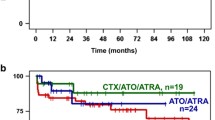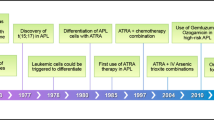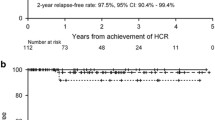Abstract
With the aim of determining the ability of all-trans retinoic acid (ATRA) to improve prognosis in refractory and relapsed acute promyelocytic leukemia (APL), the data of 45 patients resistant to previous conventional chemotherapy or in first relapse were retrospectively reviewed. Thirty-seven patients presented with typical M3, five with variant form (M3v), and three with intermediate form. Seven patients died before any chemotherapy could be given. Thirty-five patients received one course of chemotherapy combining anthracyclines and cytarabine without (n=22) or with ATRA (n=13), according to different protocols. One elderly patient received only ATRA, and two patients received only low-dose cytarabine. Nine patients died within 4 weeks of relapse. A complete remission (CR) was achieved in 29 of the 38 patients retreated after first relapse or primary failure (76.3%, 95% CI: 60–89%). Among relapsed patients, four of five patients who had initially received ATRA therapy achieved a second CR when retreated by ATRA. The median second disease-free survival (DFS) was 23.3 months. Overall median survival was 7.8 months, with a 5-year survival rate of 29% (95% CI: 14–44%). Parameters found to be associated with decreased second CR rate were presence of hemorrhages and hemostatic disorder, and high levels of GGT at the time of relapse. Factors associated with short survival were WHO performance status >1, high serum LDH levels, and coagulopathy at time of relapse. Use of ATRA at time of relapse (n=14) was significantly associated with higher CR rates (p=0.008), longer DFS (median not reached versus 7.9 months;p=0.05), and longer survival after first relapse (median 32.3 months versus 4.4 months;p=0.003). In the multivariate analysis, the only factor predictive of poor prognosis for overall survival was the absence of ATRA therapy at relapse. We conclude that ATRA is effective in the treatment of relapsed or refractory APL and appears superior to chemotherapy alone.
Similar content being viewed by others
Author information
Authors and Affiliations
Additional information
Received: 13 June 1997 / Accepted: 8 September 1997
Rights and permissions
About this article
Cite this article
Thomas, X., Anglaret, B., Thiebaut, A. et al. Improvement of prognosis in refractory and relapsed acute promyelocytic leukemia over recent years: the role of all-trans retinoic acid therapy. Ann Hematol 75, 195–200 (1997). https://doi.org/10.1007/s002770050342
Issue Date:
DOI: https://doi.org/10.1007/s002770050342




